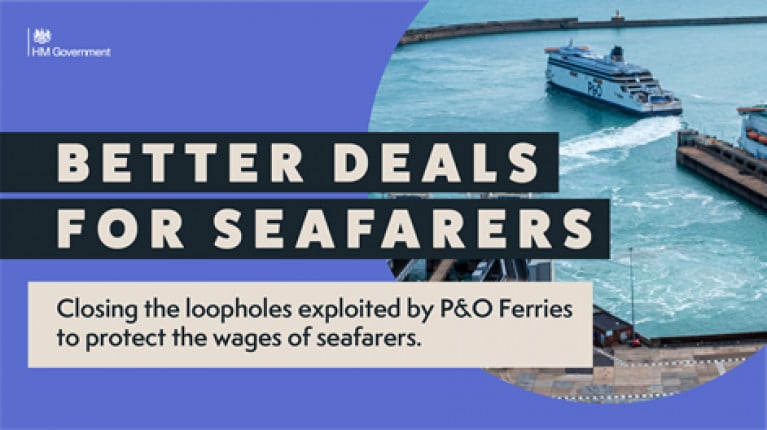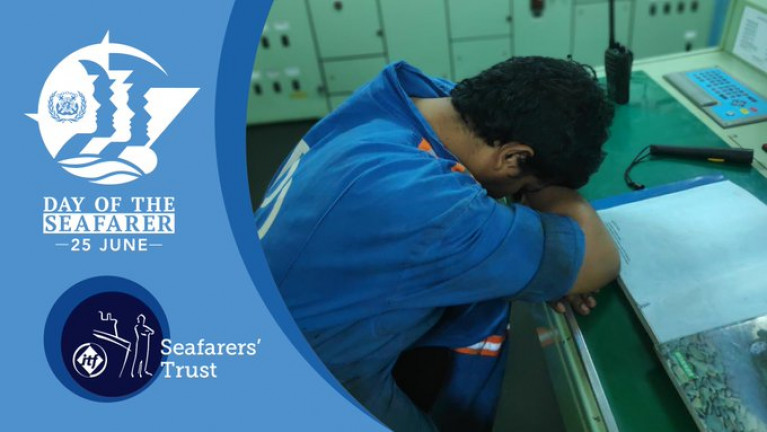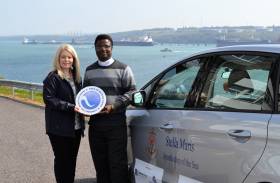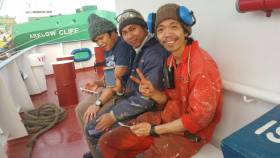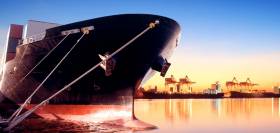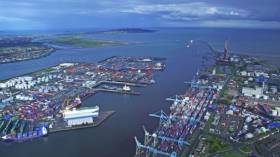Displaying items by tag: seafarers
Minister Chambers Signs MOU With Ukraine for Mutual Recognition of Seafarers Certificates
Minister Jack Chambers, on behalf of Ireland, concluded and signed a Memorandum of Understanding (MOU) with Ukraine on Thursday (1 February) for the mutual recognition of seafarers’ qualifications.
This MOU is an update of the existing arrangement wherein Ireland recognised Certificates of Competency from Ukraine as valid for service on board ships flying the Irish flag. This new MOU is now bilateral, meaning there is mutual recognition between the two states.
The arrangements have also been updated to reflect the requirements of the International Convention for Standards of Training Certification and Watchkeeping for Seafarers (STCW) and EU Directive 2022/993 on the minimum level of training of seafarers.
Ukraine is a very important state for the training and supply of high-quality seafarers to world shipping. The new MOU is welcomed by Ukraine and Ireland and secures a supply of highly qualified seafarers for Irish ship-owners.
The MOU was signed by Jack Chambers, Minister of State at the Department of Transport who welcomed the delegation from Ukraine.
Speaking at the event, the minister said: “I would like to welcome the Ukrainian delegation to Dublin and thank them for their cooperation towards this significant development. This understanding between our two countries will play an important role in increasing the supply of skilled workers into the Irish shipping sector. I would also like to wish Ukraine all the support as they continue with the process of joining the EU.”
Ukraine’s Ambassador to Ireland Larysa Gerasko said: “I thank the minister and Ireland for hosting the delegation and welcomed the visit as important in supporting Ukraine as they move to join the EU.”
Head of the State Service for Maritime, Inland Waterway Transport and Shipping of Ukraine, Yevhenii Ihnatenko said: “I would like to thank the Minister and his officials for their hospitality during the visit as well as the Head of the National Maritime College of Ireland and staff for the courtesy they have shown during the visit to the college.”
The delegation of six senior officials from the Maritime Administration of Ukraine are visiting Ireland as part of the accession process of Ukraine to become a member of the European Union. The visit is being facilitated by the European Maritime Safety Agency (EMSA). The Department of Transport has arranged a series of engagements during the week specifically to share experiences with the training of seafarers.
Abandonment of Seafarers Increasing According to International Union
The international seafarers’ trade union, Nautilus, says that abandonment of seafarers by shipowners is on the rise and that last year was the worst on record.
At the end of 2022, according to an article in its magazine, Telegraph, 103 ships were abandoned, which affected 1,682 seafarers.
“Abandonment places a terrible strain on seafarers and their families, from the uncertainty about when a loved one will return home to the financial chaos when a seafarer cannot leave a vessel to find work. The problem seems to be getting worse,” according to Nautilus, which says that cases of abandonment of ships and crews have often been driven by world events.
“The Covid pandemic and conflicts, including the war in Ukraine, have led to an uptick, however, the steady growth over the years suggests that the problem is driven by poor behaviour. It is also clearly a global failure; cases are reported in 106 countries and 85 Flag States worldwide.”
According to the United Nations Maritime Agency, the International Maritime Organisation (IMO) and the International Labour Organisation (ILO), abandonment occurs when a shipowner “fails to fulfil fundamental obligations to seafarers including payment of wages and provision of basic necessities such as food, accommodation medical care and repatriation to home. Abandonment is considered to have occurred when the ship’s Master has been left without the financial means to operate the vessel.
Following the P&O Ferries scandal which took place earlier this year, a move in the UK is to ensure that minimum wage for all seafarers has taken a step closer to becoming law.
As ITV News reports, reforms aim to ensure workers on ships regularly calling at UK ports are paid the equivalent of the national minimum wage.
The operator P&O Ferries was widely condemned on both sides of the Irish Sea after sacking nearly 800 staff members with immediate effect in March and replacing them with cheaper agency staff.
The company admitted that it broke the law by not consulting trade unions before firing crew and staff members- causing former union boss and Labour peer Lord Woodley to brand them "law-breaking profiteers".
A proposed law is now being pushed through the Houses of Parliament in an attempt to prevent a repeat of such "unacceptable behaviour".
Click here to read more.
Seafarers' UK National Minimum Wage Laws Set Sail
Seafarers numbering in tens of thousands must be paid an equivalent to the UK National Minimum Wage in a major step forward on pay protection, confirmed the British Government today (10 May).
Following P&O Ferries’ decision to sack 800 workers, the Government is introducing pay protection reforms requiring ferry operators who regularly call at UK ports to pay their workers the equivalent of the UK National Minimum Wage.
The new legislation will ban ferries that don’t pay their workers the equivalent to minimum wage from docking at UK ports.
- Ferries regularly sailing in and out of UK ports to pay an equivalent to UK National Minimum Wage
- UK leads global agenda to secure Minimum Wage Corridors with key European countries
- Second phase of Transport Secretary’s nine-point plan on seafarer pay protection begins
Announced in the Queen’s Speech, the Government will implement the changes in the next parliamentary session and will consult closely with the ports and maritime sector on the new laws.
In addition to The Harbours (Seafarers' Remuneration) Bill on securing an equivalent to UK National Minimum Wage for seafarers regularly entering UK ports, the Government is continuing positive bilateral discussions with France, the Netherlands, Spain, Germany, Ireland and Denmark. This is to ensure routes between the countries become ‘Minimum Wage Corridors’, where seafarers on routes between either country must be paid at least the equivalent of the minimum wage.
Transport secretary Grant Shapps said: “We will stop at nothing to make sure seafarers in UK ports are being paid fairly. P&O Ferries’ disgraceful actions do not represent the principles of our world-leading maritime sector, and changing the law on seafarer pay protection is a clear signal to everyone that we will not tolerate economic abuse of workers.
“We will protect all seafarers regularly sailing in and out of UK ports and ensure they are not priced out of a job. Ferry operators which regularly call at UK ports will face consequences if they do not pay their workers fairly.”
The consultation on the proposed measures (through the Dept of Transport) opened today (10 May) and will last four weeks. It will examine what sort of vessels could be included beyond ferries, and what the enforcement measures will be. Options under consideration include surcharges, suspension of port access and fines.
Business minister Paul Scully said: “In contrast to P&O Ferries, who have shown utter contempt for their workforce, this government is firmly committed to ensuring that a fair day’s work gets a fair day’s pay.
“By ensuring that seafarers working on ships which regularly call at UK ports are paid an equivalent to the minimum wage, today’s plans will be a boost for thousands of hard-working staff, while shielding them from any future exploitative actions by rogue businesses.”
The new laws means that all ferry operators who regularly call at UK ports will be legally obliged to pay an equivalent to the UK National Minimum Wage in order to access those ports, closing a legal loophole between UK and International Maritime Law that P&O Ferries ruthlessly exploited.
In pursuit of a fairer deal for seafarers, this year the Government will hold an international summit on seafarers’ rights to improve conditions for seafarers’ around the world.
Seafarers from the Philippines and many other countries who can't come on land when they reach Cork Harbour have been receiving support and supplies from local volunteers - including a delivery of 100 burgers and chips from McDonald's.
Colin Jenkins, a chaplain in the Port of Cork, boards ships that come in from all over the world and has formed close friendships with seafarers, who he says live in difficult conditions and can often be at sea for nine-month spells without seeing their families.
"Today I've visited crews aboard Filipino, Turkish and German ships, I bring them gift bags put together by several church groups with toothpaste, socks, and other items that they really need, as well as sim cards so they can call their families back home," he explained.
He was asked by the captain of a ship with a large Filipino crew if he could bring 100 McDonalds burgers and 60 portions of chips, as the takeaway food is massively popular in their home country.
More on this Cork Beo story affecting the plight of seafarers.
Global Shipping Fleet to Sound Horns on 25th June to Send Clear Message to World with a 'ShoutOutForSeafarers'
The International Chamber of Shipping (ICS), along with industry and social partners, are encouraging ships in ports around the world to sound their horns at 12 noon local time on 25th June, in honour of the International Maritime Organisations’ ‘Day of the Seafarer’.
The event is to remind the world of the urgent need to vaccinate all seafarers.
Last year’s campaign brought the crew change crisis to the world’s attention. Almost a year on, the number of crew impacted by the governments’ border restrictions has halved to 200,000. However, deadly second waves in India and other countries are seeing a return to travel bans for seafarers.
Access to vaccines is also a pressing issue; over half of the international seafarer workforce is from developing nations that have limited vaccine supplies.
Guy Platten, Secretary General of the International Chamber of shipping said: “We know just how important last year’s Heroes at Sea Shoutout was in raising the attention about the crew change crisis. Unfortunately, with the new variants and the dreadful outbreaks in India, seafarers are once again being forgotten.
The Ever Given incident (in March) showed just how important shipping and our seafarers are to global supply chains. Therefore, we are once again calling for ships at port across the globe to sound their horns at 12 noon local time on 25th of June to mark the Day of the Seafarer and ensure that seafarers voices are heard.”
ICS, along with industry and social partners are calling on ships to sound their horns when in port at 12 noon local time on the 25th June, as long as it is safe to do so, to draw attention to the plight of seafarers, and ensure that they are prioritised for the vaccine. If this unique population is left unvaccinated, it risks further enflaming the ‘crew change crisis’.
Some countries, including the United States, and the Netherlands, have begun seafarer inoculation programmes utilising their ports as vaccine hubs. Vitally they are vaccinating both native and non-native seafarers that enter their ports.
But many countries are shutting off their borders to travelers due to fears of emerging variants and the threat they will pose to domestic vaccination efforts. ICS urges ships to take part in the #ShoutOutForSeafarers campaign on 25th June to remind the world of the essential need to allow crew changes in their country and prioritise seafarers of all nations for vaccinations in their ports.
ICS is also encouraging crews to share their experiences on the day via social media using the #ShoutOutForSeafarers and #FairFuture4Seafarers hashtags.
To aid in the global seafarer vaccination effort, ICS has published a Vaccination Roadmap to help establish seafarer vaccination hubs, similar to those currently in operation.
#ports&shipping - The south Wales Port of Milford Haven is continuing its support for the Apostleship of the Sea this year with financial backing to help the organisation provide support for seafarers visiting Pembrokeshire.
The Apostleship of the Sea provides practical and pastoral care to all seafarers, regardless of nationality, belief or race. The Port Chaplains and Volunteer Ship Visitors welcome seafarers and offer welfare services and advice, as well as practical help, care and friendship. It is part of an international network known to the maritime world as Stella Maris, and works in more than 300 ports around the world.
In 2018, the Port Chaplains and Volunteers at the Apostleship of the Sea carried out 697 ship visits within the Port of Milford Haven, reaching around 15,000 seafarers. They also provided transport for crews of 359 vessels from their jetty to town and the main port offices.
Father Paul Osunyikanmi, Apostleship of the Sea Chaplain for the Port of Milford Haven and Pembroke Port, commented: “The Port of Milford Haven’s support over the years has helped us deliver a reliable service to visiting seafarers. Seafarers can sometimes be over looked and undervalued so their welfare, especially whilst away from home for so long, is very important. We are grateful that the Port recognises this importance, and is supportive of our efforts.”
Anna Malloy, Stakeholder Engagement and Communications Manager at the Port of Milford Haven, added: “Wellbeing is an important element of safety, and safety is at the heart of everything we do at the Port. That is why we value the work of the Apostleship of the Sea and other organisations seeking to enhance seafarers’ welfare. As the UK’s largest energy port, we welcome seafarers from all over the globe who travel on some of the world’s largest ships to bring in vital energy supplies. Many of these men and women have limited access to communication and transport once off the ship. The Apostleship of the Sea offers a comprehensive service that deploys Port Chaplains and Ship Visitors to focus on the needs that are greatest for seafarers visiting the Port.”
Irish Tech Company Help Seafarers Connect to Loved Ones Over Festive Period
#Seafarers - Over three million seafarers, both men and women live in the twilight world of big shipping according to the Seamens Christian Friend Service (SCFS).
Seafarers are responsible for most of the goods you will of had acquired over the Christmas season. It's a lonely life and as such they don't get to spend Christmas with their family.
Crews roam the world's oceans for up to 12 months at a time. They come from more than 100 different nations and speak dozens of language. For most of them accessing the internet is synonym of keeping in touch with the family.
This year, SEA-Tech Evolution Ltd, an Irish IT company established in 2007, worked with the Port of Cork, Port of Waterford and Rosslare at improving crew welfare. The company take this service very seriously but it is sometimes hard to convince the shipping industry of the benefits of decent internet connectivity.
Commenting on the benefits of such technology, Arnaud (R.no) Disant, Engineer (CTO) at SEA-Tech and Lecturer at National Maritime College of Ireland, said you know you’ve done something good this year when you see a smile on the face of a man that truly values your work.
State Broke EU Rules Over Seafarer Qualifications Says High Court
#Training - A marine notice issued earlier this year on accreditation for seafarers qualifications has “no legal basis” and must be quashed, says the High Court.
According to The Irish Times, the court has also directed Transport Minister Shane Ross to recognise British-accredited seafarer training provided in Ireland.
The judgement detailed that the Marine Survey Office was in breach of several EU regulations in failing to approve sea survival refresher courses provided by the likes of Cork Harbour’s National Maritime College of Ireland, which are accredited by Britain’s Maritime and Coastguard Agency.
In addition, the European Commission has given Ireland two months to comply with EU law regarding the mutual recognition of qualifications for seafarers.
The Irish Times has more on the story HERE.
Marine Notice: Training Course Statutory Certification In Ireland
#MarineNotice - Marine Notice No 6 of 2017 from the Department of Transport, Tourism and Sport (DTTAS) advises that anyone undertaking maritime training in Ireland should ensure that any course leading to certification is approved by and complies with the statutory certification issued by the competent authority.
The Minister for Transport, Tourism and Sport is the competent authority for the approval of statutory maritime training in Ireland under both EU and Irish law. The Marine Survey Office of the DTTAS carries out this function on behalf of the minister.
Specifically, IMO STCW courses (including short courses) carried out in Ireland may only be approved by the Minister for Transport, Tourism and Sport. Candidates for seafarer and fisher certification should be aware that the DTTAS will only accept certificates issued by training providers approved by the competent authority for training carried out in Ireland.
EU mutual recognition applies to certificates issued in other EU/EEA states for training approved by and carried out under the conditions set down by the competent authorities in those member states.
Ship owners, fishing vessel owners and those employing seafarers and fishers should ensure that crew whose training was carried out in Ireland hold appropriate certification issued under the authority of the Minister for Transport, Tourism and Sport.
A holder of a certificate that is not valid, and who is serving on a vessel, may adversely affect the certification of that vessel. Such vessels, on inspection, may be subject to enforcement action for non-compliance with statutory requirements.
The DTTAS publishes a full list of approved training providers on the new Seafarers web portal.


























